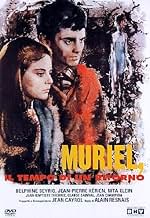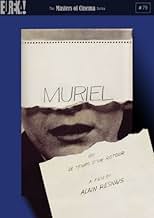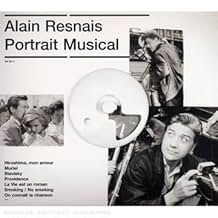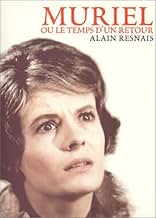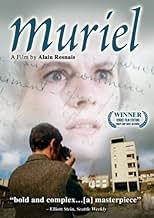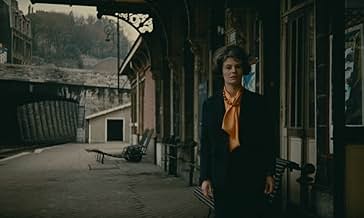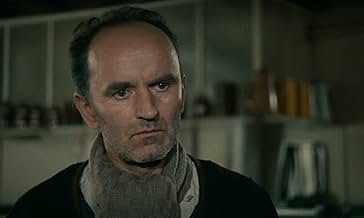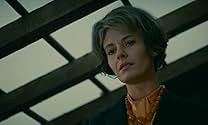VALUTAZIONE IMDb
7,0/10
4009
LA TUA VALUTAZIONE
Nella cittadina balneare di Boulogne, nessuno sembra in grado di affrontare il proprio passato, meno che meno Hélène, una commessa di mobili antichi, il figliastro Bernard e il suo ex amante... Leggi tuttoNella cittadina balneare di Boulogne, nessuno sembra in grado di affrontare il proprio passato, meno che meno Hélène, una commessa di mobili antichi, il figliastro Bernard e il suo ex amante Alphonse.Nella cittadina balneare di Boulogne, nessuno sembra in grado di affrontare il proprio passato, meno che meno Hélène, una commessa di mobili antichi, il figliastro Bernard e il suo ex amante Alphonse.
- Regia
- Sceneggiatura
- Star
- Premi
- 3 vittorie e 3 candidature totali
Jean-Baptiste Thiérrée
- Bernard Aughain
- (as Jean-Baptiste Thierrée)
Wanda Kerien
- La cliente
- (as Wanda Kérien)
Recensioni in evidenza
It's about 50 years since I first saw Muriel; in those days the wounds of the Algerian war were still fresh: bodies of Algerian immigrants were found floating in rivers, Sartre's apartment was fire-bombed because he'd supported Algerian independence and so on. Resnais had enough reason to make a film about those troubled days. The trouble with the film has to do with the uneasy juxtaposition of domestic drama (the unhappy love of Hélène and Alphonse) with the ordeal of Bernard and Robert in Algeria, and the dead girl over whom Bernard obsesses. The love story is so much more interesting than the political theme that we are left frustrated with the necessity of ignoring the latter to the benefit of the former.
Delphine Seyrig gives a wonderful performance as Hélène; she's always in movement, trying to calm Bernard down, trying to coax some emotion out of the stony Alphonse, on the phone with Claudie cadging some money to gamble at the casino (she's not good about repaying debts). Jean Champion shows up in the second half as Ernest, Alphonse's brother-in-law, trying to bring him back to a sense of his duties to his family. He sings that wonderful song at the lunch party, then launches into an angry tirade about Alphonse's dereliction of duty. It's a superb performance. Nita Klein as Françoise is appropriately prickly, analyzing her options as she sees Alphonse sliding away from her. Claude Sainval is very oily as de Smoke, a man who can't stop thinking about the money he's lost on a derelict building: ''can't even get the doorknobs from it''
Delphine Seyrig gives a wonderful performance as Hélène; she's always in movement, trying to calm Bernard down, trying to coax some emotion out of the stony Alphonse, on the phone with Claudie cadging some money to gamble at the casino (she's not good about repaying debts). Jean Champion shows up in the second half as Ernest, Alphonse's brother-in-law, trying to bring him back to a sense of his duties to his family. He sings that wonderful song at the lunch party, then launches into an angry tirade about Alphonse's dereliction of duty. It's a superb performance. Nita Klein as Françoise is appropriately prickly, analyzing her options as she sees Alphonse sliding away from her. Claude Sainval is very oily as de Smoke, a man who can't stop thinking about the money he's lost on a derelict building: ''can't even get the doorknobs from it''
"Muriel" (1963) directed by Alain Resnais is a drama about the persistence of memory (aren't all Resnains' films? Incidentally, I named my review of "Hiroshima Mon Amour" that I saw about two years ago, "Persistence of Memory".)
Muriel of the title is dead by the time the movie begins, the victim of torture by the French soldiers during the occupation of Algeria. One of the soldiers, Bernard, is back in France living with his step-mother, Helene (Delphine Seyrig) in the province city Boulogne and hunted by the memories of war and Muriel. Helen deals with her own past and memories of Alphonse (Jean-Pierre Kérien), an ex-lover who comes from Paris to visit her in the company of his new 20-years-old girlfriend, Françoise (Nita Klein)
The story which Resnais tells is simple and the trailer for the movie gives a viewer a very good idea of what they are about to see: The Past. The present. The future - is it possible? Uncertainty. Suspicions. Lies. Four main characters, Helene, Alphonse, Bertrand, and Françoise are in search of what they are. There will be secrets and confessions. Is that time to love? The main theme of the film is reality vs. memory of it. Can we always trust ourselves with what we remember? Does our memory reflect the events the way they really happened or our vision of them is altered as time passes and new realities inevitably enter our lives?
What makes "Muriel" unique after all these years is the way the director presents the journey into the past of his characters, how they see it, and how it affects their present lives and the possibility (or rather impossibility) of love and happiness. Alain Resnains uses quick flashes of memory in the form of almost hypnotizing jump cuts of his genius cinematographer Sacha Vierny (Resnains and Vierny had made 10 films together). Vierny provided beautiful melancholic visual palette of washed out colors that created the atmosphere of unbearable sadness, loss, and hopelessness. Vierny who always underlined his preference for atmosphere over formal perfection, had said, "My satisfaction is that the photography is not remarked on too much for itself". The visual originality and innovation are accompanied by unusual unnerving soundtrack, eerie and haunting that adds to the understanding of guilt and remorse the film characters live with.
"Muriel" is a puzzling and multi-layered film that is easy to admire and meditate on. It is not entertaining or heart-warming and it is hard to identify with its heroes (or anti-heroes) but is always fascinating and rewarding and it may reveal its secrets after multiple viewings.
Muriel of the title is dead by the time the movie begins, the victim of torture by the French soldiers during the occupation of Algeria. One of the soldiers, Bernard, is back in France living with his step-mother, Helene (Delphine Seyrig) in the province city Boulogne and hunted by the memories of war and Muriel. Helen deals with her own past and memories of Alphonse (Jean-Pierre Kérien), an ex-lover who comes from Paris to visit her in the company of his new 20-years-old girlfriend, Françoise (Nita Klein)
The story which Resnais tells is simple and the trailer for the movie gives a viewer a very good idea of what they are about to see: The Past. The present. The future - is it possible? Uncertainty. Suspicions. Lies. Four main characters, Helene, Alphonse, Bertrand, and Françoise are in search of what they are. There will be secrets and confessions. Is that time to love? The main theme of the film is reality vs. memory of it. Can we always trust ourselves with what we remember? Does our memory reflect the events the way they really happened or our vision of them is altered as time passes and new realities inevitably enter our lives?
What makes "Muriel" unique after all these years is the way the director presents the journey into the past of his characters, how they see it, and how it affects their present lives and the possibility (or rather impossibility) of love and happiness. Alain Resnains uses quick flashes of memory in the form of almost hypnotizing jump cuts of his genius cinematographer Sacha Vierny (Resnains and Vierny had made 10 films together). Vierny provided beautiful melancholic visual palette of washed out colors that created the atmosphere of unbearable sadness, loss, and hopelessness. Vierny who always underlined his preference for atmosphere over formal perfection, had said, "My satisfaction is that the photography is not remarked on too much for itself". The visual originality and innovation are accompanied by unusual unnerving soundtrack, eerie and haunting that adds to the understanding of guilt and remorse the film characters live with.
"Muriel" is a puzzling and multi-layered film that is easy to admire and meditate on. It is not entertaining or heart-warming and it is hard to identify with its heroes (or anti-heroes) but is always fascinating and rewarding and it may reveal its secrets after multiple viewings.
This movie was made in the context of the revolution in the French cinema and novel which took place in the sixties. Just like the work of Margueritte Duras and Claude Simon whose novels avoided a straightforward narrative style, this movie tells its story in an episodic and almost surreal manner.
This can make it difficult going for anyone seeking a simple tale, well told. But, if your taste runs to the more abstract, there is a lot to like here. Like "Juliet of the Spirits" this movie is infused with an intensely subjective portrayal of the story which unfolds of a betrayed love, an act of war time atrocity, and the desparate plight of a compulsive gambler.
Excellent cinematography and direction make this movie a wonderful and richly textured work which deserves several viewings to appreciate completely.
This can make it difficult going for anyone seeking a simple tale, well told. But, if your taste runs to the more abstract, there is a lot to like here. Like "Juliet of the Spirits" this movie is infused with an intensely subjective portrayal of the story which unfolds of a betrayed love, an act of war time atrocity, and the desparate plight of a compulsive gambler.
Excellent cinematography and direction make this movie a wonderful and richly textured work which deserves several viewings to appreciate completely.
10Aw-komon
The first time I saw 'Muriel' (it was, for years, extremely hard to find on video and only one video store carried it even in movie mecca L.A.) I was completely confounded by it. The radical presentation of the ordinary characters in the context of their transcendent thoughts and memories seemed to be uninteresting and bland, precisely because I hadn't thought of its connections to the universal. I didn't think it warranted any closer attention. But I knew there was something there I was uncomfortable with, I knew I had to come back to this film sometime and reassess it.
Needless to say, I am glad I made that reassessment because this is such an amazingly satisfying film, once all the pieces of the puzzle come togeher in your head in their subtle details. It is nearly flawless in conception and execution and has to be one of the supreme works of art this century. It works on more levels than any other film I can think of, even 'Pierrot Le Fou' and '8-1/2.' The difference is, almost all of it is hidden at first sight. You definitely have to pay UNDIVIDED ATTENTION and CONCENTRATE to start with, especially if you're reading the subtitles in English. Every word is there for a purpose and every shot counts. I'd suggest that you watch it (thank god it is now available on video and at such a reasonable price)at the bare minimum 3 times before you even presume to make a judgment. Here are only a few of the things I like about 'Muriel:' It is a thriller with many comic elements that ultimately becomes a sublime tragedy of modern existence. It has superb 'realism' in acting to beautifully contrast with what it's really about: the transcendent aspects of life such as memory and the way it and they (the other aspects) affect the present. The beautiful faded-tone, color photography is psychologically calculated (a definite influence on 'Red Desert') for effect and just indescribably poetic. The virtuoso, quick cutting in the middle section is completely chronological in nature but elegantly provides multiple perspectives without distorting things with unnecessary length (since all these things are going on pretty much at the same time).
I cannot recommend this film highly enough for anyone interested in great cinema.
Needless to say, I am glad I made that reassessment because this is such an amazingly satisfying film, once all the pieces of the puzzle come togeher in your head in their subtle details. It is nearly flawless in conception and execution and has to be one of the supreme works of art this century. It works on more levels than any other film I can think of, even 'Pierrot Le Fou' and '8-1/2.' The difference is, almost all of it is hidden at first sight. You definitely have to pay UNDIVIDED ATTENTION and CONCENTRATE to start with, especially if you're reading the subtitles in English. Every word is there for a purpose and every shot counts. I'd suggest that you watch it (thank god it is now available on video and at such a reasonable price)at the bare minimum 3 times before you even presume to make a judgment. Here are only a few of the things I like about 'Muriel:' It is a thriller with many comic elements that ultimately becomes a sublime tragedy of modern existence. It has superb 'realism' in acting to beautifully contrast with what it's really about: the transcendent aspects of life such as memory and the way it and they (the other aspects) affect the present. The beautiful faded-tone, color photography is psychologically calculated (a definite influence on 'Red Desert') for effect and just indescribably poetic. The virtuoso, quick cutting in the middle section is completely chronological in nature but elegantly provides multiple perspectives without distorting things with unnecessary length (since all these things are going on pretty much at the same time).
I cannot recommend this film highly enough for anyone interested in great cinema.
Resnais is one of the seven sages of cinema, perhaps even one of the most important ones. Within him we find others, like Godard and Marker, who inherited the problems he first posited with clarity of vision and eloquence of mood. Problems of memory, firstly how the past forms manifest in consciousness and synthesize an illusionary space which we then inhabit (in itself a poignant inspection of the mechanisms of cinema), more importantly what these past forms are, which we understand as the self and identity, and how they trap us in meaningless dilemmas.
His astounding contribution to this field, is in how he brilliantly envisions this space by means of a visual vocabulary and how he articulates within it. The museum in Hiroshima (which reappears here again, as homage), the hotel in Marienbad.
We find the wandering of memory again in Muriel, in a form a tad less inspired this time than those films.
Passions past and present, which defined the participants as persons and left indelible marks on their souls, we see how they appear again after time. We see these people use memory as the only means of reliving time, of painfully trying to claim again the ethical vindication that escaped them the first time. How this past, projected in their minds, appears again around them to trap them anew. And we see how, their lives stifled as a result of those past anxieties, the memory of these things points at no way out.
The characters in this are fittingly restless, always rushing particularly nowhere, actually running from things they won't admit. Running perhaps against all hope that they will face them again. Moments of reflection are burdened with half-remembered sadness, while life outside continues indifferently.
Entire scenes of this play out as they would in ordinary melodrama, then the narrative seems to break down for a time. Virtually recalling fragments of images and conversations which mean nothing, we become privy to the destructive powers of memory. We actually experience the disorientation as part of the movie.
But Muriel lacks something in comparison to those other films. Perhaps it's the political angle (re the Algiers conflict and how it resonates in a complacent French bourgeois society), which in previous Resnais films is quietly buried underneath, dormant and supine, yet here greets us upfront, often violently demanding our discourse. Perhaps it's the pastel color palette, that may had been intented to invoke the contours of melodrama whose tropes the movie rearranges, but renders the film now a relic of the times.
Nonetheless Resnais here gives us an important realization. How we spend the present moment reliving past sufferings or anticipating the future with fear or hope, allowing these chimeras of the mind, born of desire, to cloud our soul, to disrupt our contact with the world. He gives us this not as a grave speech, something Bergman would do who was impotent in the face of suffering, but in the form of a merry jingle, which one character playfully recites after a dinner gathering, as a way of reminding us how trivial and unimportant these past or future fears are.
His astounding contribution to this field, is in how he brilliantly envisions this space by means of a visual vocabulary and how he articulates within it. The museum in Hiroshima (which reappears here again, as homage), the hotel in Marienbad.
We find the wandering of memory again in Muriel, in a form a tad less inspired this time than those films.
Passions past and present, which defined the participants as persons and left indelible marks on their souls, we see how they appear again after time. We see these people use memory as the only means of reliving time, of painfully trying to claim again the ethical vindication that escaped them the first time. How this past, projected in their minds, appears again around them to trap them anew. And we see how, their lives stifled as a result of those past anxieties, the memory of these things points at no way out.
The characters in this are fittingly restless, always rushing particularly nowhere, actually running from things they won't admit. Running perhaps against all hope that they will face them again. Moments of reflection are burdened with half-remembered sadness, while life outside continues indifferently.
Entire scenes of this play out as they would in ordinary melodrama, then the narrative seems to break down for a time. Virtually recalling fragments of images and conversations which mean nothing, we become privy to the destructive powers of memory. We actually experience the disorientation as part of the movie.
But Muriel lacks something in comparison to those other films. Perhaps it's the political angle (re the Algiers conflict and how it resonates in a complacent French bourgeois society), which in previous Resnais films is quietly buried underneath, dormant and supine, yet here greets us upfront, often violently demanding our discourse. Perhaps it's the pastel color palette, that may had been intented to invoke the contours of melodrama whose tropes the movie rearranges, but renders the film now a relic of the times.
Nonetheless Resnais here gives us an important realization. How we spend the present moment reliving past sufferings or anticipating the future with fear or hope, allowing these chimeras of the mind, born of desire, to cloud our soul, to disrupt our contact with the world. He gives us this not as a grave speech, something Bergman would do who was impotent in the face of suffering, but in the form of a merry jingle, which one character playfully recites after a dinner gathering, as a way of reminding us how trivial and unimportant these past or future fears are.
Lo sapevi?
- QuizAt a press conference at the Venice Film Festival in 1963, Alain Resnais said that his film depicted "the malaise of a so-called happy society. ...A new world is taking shape, my characters are afraid of it, and they don't know how to face up to it."
- ConnessioniFeatured in Whiplash (2014)
I più visti
Accedi per valutare e creare un elenco di titoli salvati per ottenere consigli personalizzati
- How long is Muriel?Powered by Alexa
Dettagli
- Tempo di esecuzione1 ora 57 minuti
- Mix di suoni
- Proporzioni
- 1.66 : 1
Contribuisci a questa pagina
Suggerisci una modifica o aggiungi i contenuti mancanti

Divario superiore
By what name was Muriel, il tempo di un ritorno (1963) officially released in India in English?
Rispondi

